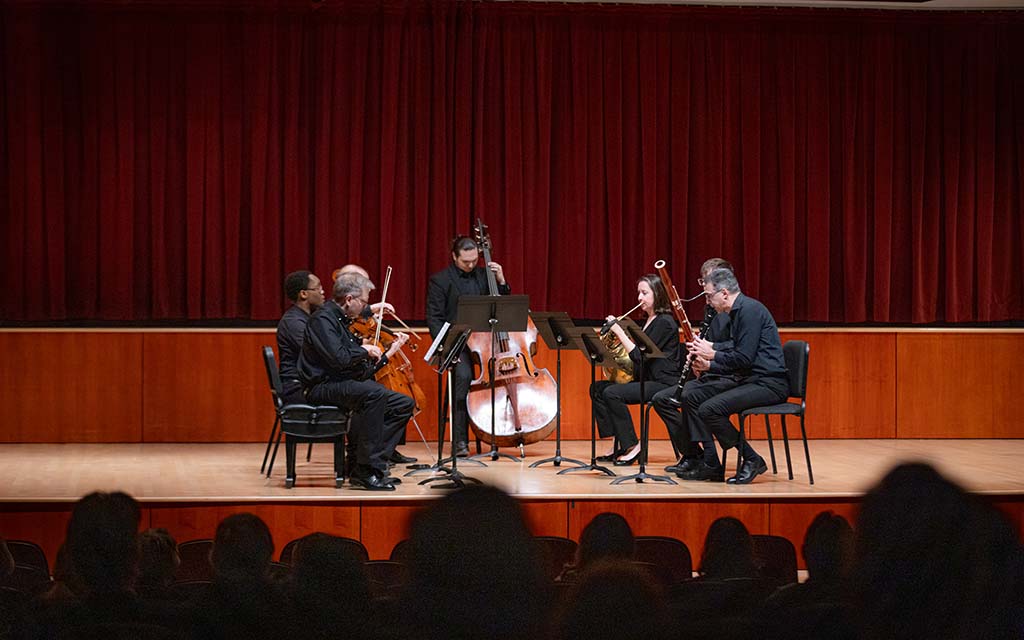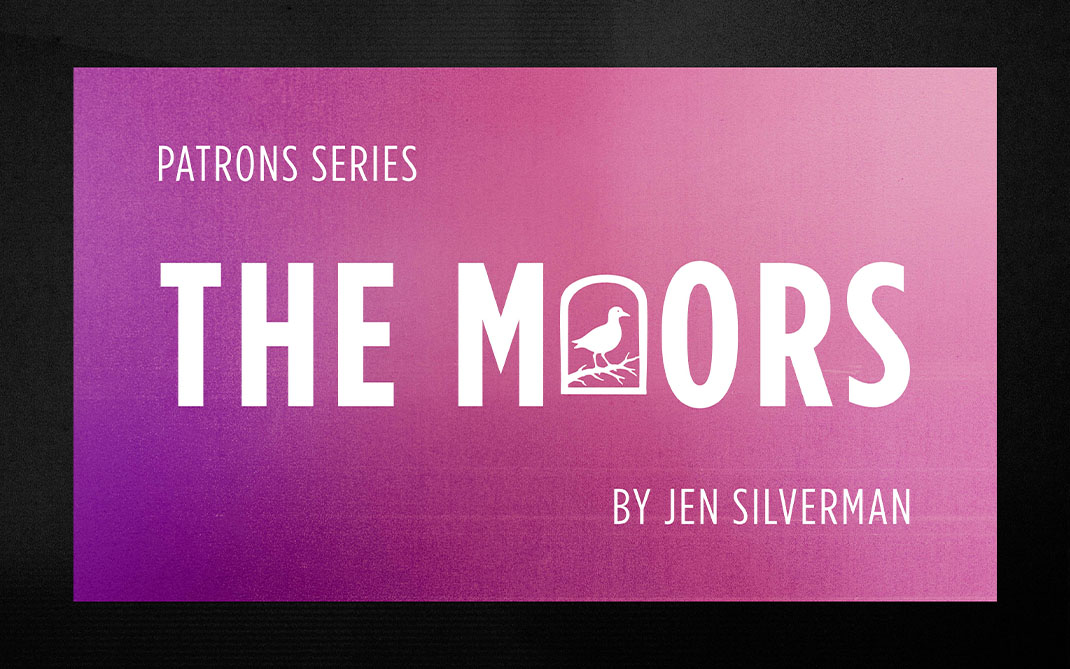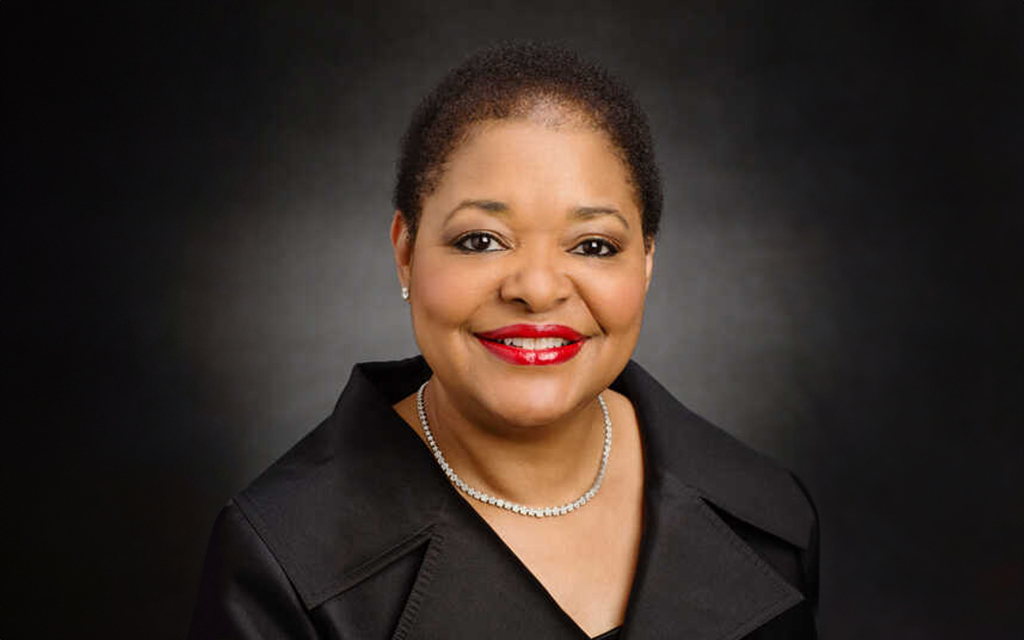The rise of Jeff Nichols: UNCSA alumnus and independent film icon
School of Filmmaking alumnus Jeff Nichols (B.F.A. Directing ‘01) is a renowned writer and director known for his distinctive voice in contemporary American cinema. His films often explore the complexities of human relationships, the struggles of the working class and the tension between tradition and modernity.
After first gaining recognition with his debut feature film "Shotgun Stories" in 2007, Nichols has gone on to create several critically acclaimed films, including "Take Shelter," "Mud," and "Loving," His ability to blend genre elements with deeply personal storytelling has quickly established him as a significant voice in independent film.
Most recently, Nichols debuted "The Bikeriders," which follows a motorcycle club in the mid-1960s. Showcasing the notable talents of actors Jodie Comer, Tom Hardy, Austin Butler and longtime collaborator Michael Shannon, "The Bikeriders" premiered at the Telluride Film Festival in August 2023, followed by a theatrical release in June 2024.
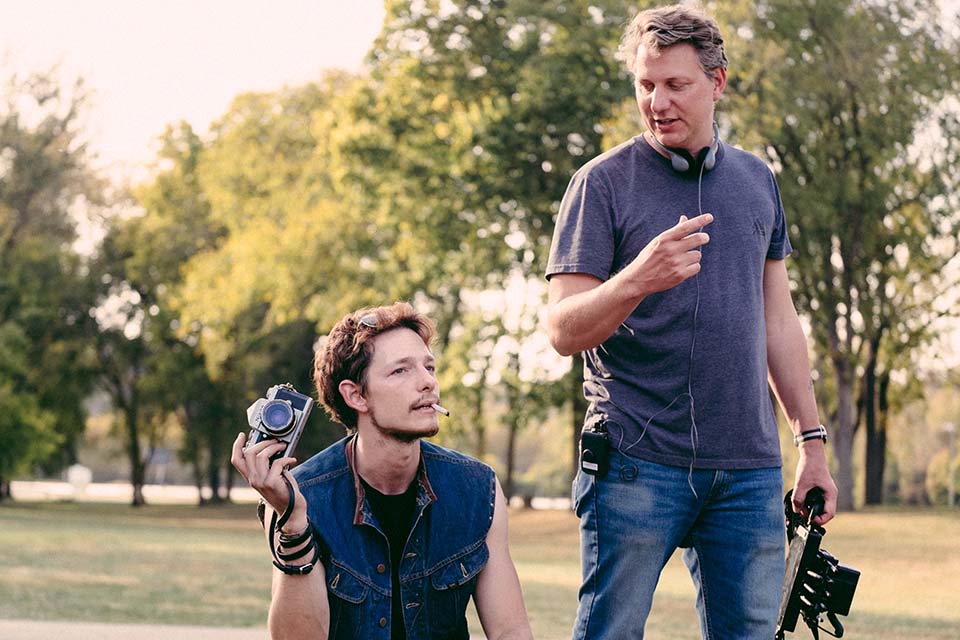
Director Jeff Nichols and actor Mike Faist on the set of "The Bike Riders," a Focus Features release / Photo: Kyle Kaplan/Focus Features.
Nichols credits his time at the School of Filmmaking with helping him learn the foundational and technical skills of filmmaking. At UNCSA, he was exposed to filmmakers who shaped his career and forged lifelong connections and friendships. Since graduating, Nichols has continued to push the boundaries of cinematic storytelling — cementing himself as a force in independent filmmaking.
From zero to sixty
Growing up in Little Rock, Arkansas, Nichols didn’t have much exposure to filmmaking before coming to UNCSA in the fall of 1997. However, Nichols was a young reader, entranced with the likes of Tom Sawyer and Huckleberry Finn, Mark Twain’s iconic coming-of-age stories on the wide, muddy rivers of the American South — a setting that later inspired his film "Mud," starring Matthew McConaughey.
Nichols’ choice to come to UNCSA’s newly-created School of Filmmaking came down to two words: "public funding." "Public funding was integral to my being able to afford to go to film school," says Nichols. "Not only did that affect tuition, but the school paid for us to make our films and student films. Had there been an additional cost on top of tuition, I don’t think, financially, my family could have shouldered that."
At UNCSA, Nichols quickly went "from zero to sixty." "I hadn’t written a script page until my freshman year," he recalls. The school's rigorous program and immersive learning environment provided him with the essential technical skills and confidence needed to pursue filmmaking.
"I really had no background in the industry, no background in the mechanics of filmmaking," he says. "My training was integral in terms of giving me the foundation to build a film career. I stepped out of that school after four years with enough knowledge and confidence to try my hand at making an independent feature."
One of the most impactful aspects of Nichols' education at UNCSA was his peers and mentors. "The things I took away most were really the relationships and the people that I met when I was there," he says. "I still work with a lot of people that I met while I was at film school." These enduring connections have been crucial throughout his career, allowing him to collaborate with trusted colleagues who share his vision and work ethic.
The strong network Nichols built at UNCSA continues to be a cornerstone of his professional life. "What I find really incredible is that we’re essentially playing in the pros now," he says. "To work with people that you’ve known for so long and have them all be able to perform at the level that you need them to is really amazing. It’s a testament to the foundation built at UNCSA because these are not easy jobs that I’m asking these people to do — they have to function at a level that is elite, to be quite honest. It’s pretty incredible that you can function at that level with people that are not just your friends, but your old friends."
To work with people that you’ve known for so long and have them all be able to perform at the level that you need them to is really amazing. It’s a testament to the foundation built at UNCSA because these are not easy jobs that I’m asking these people to do.
Jeff Nichols
Nichols also credits UNCSA with exposing him to the works of great filmmakers through the weekly film screenings at the ACE Theater Complex. "It is the first place that I saw ‘Badlands’ by Terrence Malick, which has been hugely influential. It is the first place that I saw ‘The Hustler’ with Paul Newman. These are two crucial films in my understanding of what cinema could be, and those were both screened on film prints in theaters for me as a UNCSA student."
Creating "The Bikeriders"
Nichols' recent film, "The Bikeriders," is a testament to his passion for storytelling. The inspiration for the film came from Danny Lyon's 1968 book of the same name, which features a collection of photographs and interviews detailing the lives of Chicago's motorcycle club members in 1965.
When Nichols discovered the book in 2003, he was captivated by the depth and authenticity of Lyon's work. He saw the potential to translate that raw, vivid storytelling into a cinematic experience. "Danny wasn’t just a photographer; he was really into journalism, and what that book represents for me is a complete detail of a subculture, a really specific subculture," he explains. "All of those details are incredibly important, and there they were, just sitting in this book, waiting to be brought back to life."
For Nichols, nostalgia plays a significant role in his connection to the story. "The way I define nostalgia is it’s our recognition of a past moment and or feeling that will never exist again," he says. "It’s something we’ve experienced in our lives that is gone but for the memory of it." This sense of nostalgia is woven into the fabric of "The Bikeriders," adding a layer of emotional depth to the narrative.
To bring this vision to life, Nichols cast actors who embodied the spirit and energy of the story. "When I meet a person, I’m experiencing their energy, their personality, everything that they’re giving off as a human being," he says. His casting process is deeply intuitive, relying heavily on his understanding of the characters he creates.
"I write all my own scripts, so I have kind of an inside track on that because I’ve been thinking about them for a long time, and they live very close to me personally." Ultimately, it comes down to that familiarity, trusting his gut and a little bit of luck.
The cast of "The Bikeriders" delivered. As described by a review in The New York Times, the leading roles are "a troika of charisma bombs… Nicely supported by a sprawling cast of other good lookers and hard workers."
Directing on the page
"The Bikeriders" wasn’t Nichols’ first film influenced by literature. Throughout his career, he’s been drawn to stories with deep emotional resonance, inspired by books, notable films and his surroundings growing up and studying in the American South.
Nichols hatched the idea for his 2012 film "Mud" when he was still in college at UNCSA. At the time, he was reading Cormac McCarthy and Larry Brown, two Southern Gothic authors who famously plumb the depths of human nature. In his film-class daydreams, Nichols couldn’t shake the image of a man living alone on an island in a river, looking for redemption from a violent past. The storyline of "Mud" was born from a desire to combine Twain’s classic distillation of childhood with the grimmer undercurrents of McCarthy and Brown.
In all of his projects, Nichols says that the writing comes first. "I think much more about writing than I do directing," he explains. "But I also direct on the page when I’m writing my scripts. I have a lot of rules that I apply in terms of what can and cannot go onto a page because I know that no matter how interesting I make it, it’s ultimately a blueprint for a visual format."
I think much more about writing than I do directing. But I also direct on the page when I’m writing my scripts. I have a lot of rules that I apply in terms of what can and cannot go onto a page because I know that no matter how interesting I make it, it’s ultimately a blueprint for a visual format.
Jeff Nichols
Nichols has also served as a producer on several films, but he says those projects are "few and far between," mainly due to capacity. "My producing partners, Brian Kavanaugh-Jones and Sarah Green, are up for us potentially doing more, but my bandwidth is limited," he explains.
The few projects he has produced have happened because a friend or trusted colleague asked for help. "It’s when a friend comes to me that I really respect and I’ve had some connection with in my films and says, ‘I need help getting this movie made,’" says Nichols. "That happened with Michael Shannon’s 2023 film ‘Eric Larue,’ and with [UNCSA alumnus] Michael Abbott Jr.’s 2016 film ‘In the Radiant City.’"
The future of feature filmmaking
What’s on the horizon for Nichols? Continuing to make feature films that tell compelling and emotional stories. "I really believe in the future of feature filmmaking," says Nichols. "Everybody likes to talk about longer format, television, and streaming, and obviously, there is a lot of opportunity there, but I make movies and I love that format."
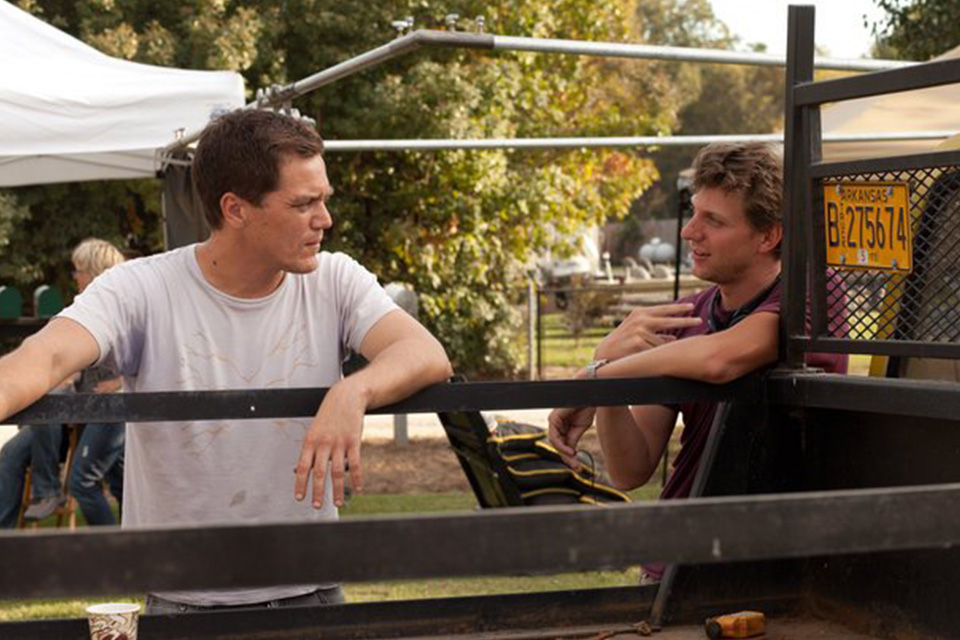
Jeff Nichols (R) and actor and long-time collaborator Michael Shannon.
For Nichols, the return to theaters has been really encouraging to see over the past few years. "I feel this thing happening right now, where people are going back to the theaters more and more," he says. "I think after being at home for three years — binging as much TV as they can — the idea of cinema and that two-hour format is appealing."
Ultimately, Nichols likes a sense of completion at the end of a film. "I like something where you can sit down and get a beginning, a middle, and an end and be done, and then talk about it and think about it as a whole piece. That’s very appealing to me and I hope the world’s up for more of that because that’s what I intend to make."
When thinking of words of wisdom for Fighting Pickles, Nichols adds, "Take heart in the fact that if I can do this, anyone can do this."
Get the best news, performance and alumni stories from UNCSA.
SUBSCRIBE TO OUR NEWSLETTERS(OPENS IN NEW TAB)(opens in new tab)
Originally published: June 2, 2016; Updated: July 26, 2024

